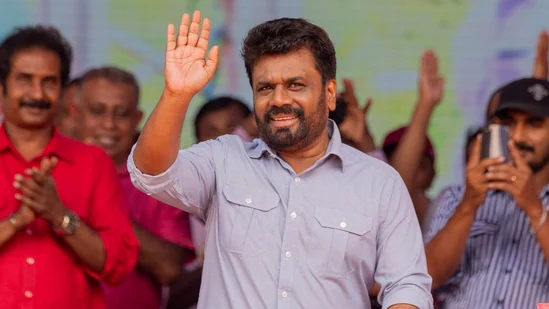Anura Kumara Dissanayake, a leftist leader and member of Sri Lanka’s National People’s Power (NPP) alliance. He assumed office as the new president on Monday. His victory marks a shift in leadership for the island nation. It has long been governed by powerful political families. Dissanayake has vowed to bring much-needed change as the country recovers from its worst economic crisis in over 70 years.
A Promise to Fight Corruption and Strengthen Democracy
In his inaugural speech at the president’s office, Dissanayake, 55, pledged to protect democracy and address the challenges facing Sri Lanka. He emphasized the need for cleaner politics and a different political culture, stating, “I am ready to commit to that change.”
Dissanayake’s campaign centered on his commitment to fighting corruption and reviving the economy. Millions of Sri Lankans voted for him, placing their trust in his vision for a better future.
From Marxism to the Center
Dissanayake is the leader of the Janatha Vimukthi Peramuna (JVP), a party with roots in Marxist economic policies. Historically, the JVP supported protectionism and state intervention. However, in recent years, the party has taken more centrist positions, which likely helped Dissanayake appeal to a broader base of voters.
He ran as the candidate of the NPP, an alliance that includes his JVP party. His victory displaced the incumbent president, Ranil Wickremesinghe, a veteran politician who had served out the term of former president Gotabaya Rajapaksa.
Supporters Celebrate a Victory for the People
Outside the president’s office, dozens of supporters celebrated Dissanayake’s win. Many held posters with his image and waved the Sri Lankan flag while chanting “AKD” — his popular initials.
One supporter, Iroma Nilanthi Liyanage, a beautician, expressed her joy, saying, “We worked very hard for this victory. For the first time, the poor people have someone who stands for them.” Dissanayake’s campaign resonated with many Sri Lankans who felt left behind by previous governments.
Challenges Ahead: A Fragile Economy and IMF Deal
Although Dissanayake won the presidential election, his party holds just three of the 225 seats in parliament. This means he faces the tough task of gaining support from other parties to pass important legislation, including the country’s budget.
One of his first tasks will be to navigate Sri Lanka’s $2.9 billion bailout deal with the International Monetary Fund (IMF). This agreement is crucial for stabilizing the country’s fragile economy, which collapsed in 2022. However, Dissanayake has expressed a desire to revisit the terms of the IMF deal, which has worried some investors.
Debt Deal and Investor Concerns
Sri Lanka defaulted on its debt during its economic crisis, and a debt deal was finalized just last week. Investors fear that Dissanayake’s Marxist-leaning policies might lead him to renegotiate this deal with bondholders, which could delay future disbursements from the IMF. Sri Lanka’s dollar bonds fell between 2.88 and 3.28 cents on the dollar after Dissanayake’s win, reflecting investor concerns about the future of the debt deal.
Neighbouring Countries Congratulate Dissanayake
Several countries in the region, including India, Pakistan, and the Maldives, sent their congratulations to Dissanayake after his victory. China, Sri Lanka’s largest bilateral creditor, also expressed its support.
A spokesperson from China’s foreign ministry said that the country hopes Sri Lanka will maintain national stability and development. They also offered China’s willingness to assist in Sri Lanka’s economic and social recovery.
While there was no specific mention of revisiting debt agreements with China, the spokesperson emphasised. Along with China’s desire to continue working together on the Belt and Road Initiative.
Looking Ahead
Dissanayake takes office at a pivotal time for Sri Lanka. The country is still reeling from the economic collapse of 2022, which led to mass protests and the resignation of former president Gotabaya Rajapaksa. As Dissanayake forms his new cabinet and begins his presidency, all eyes will be on his ability to unite the political landscape and steer Sri Lanka through its economic recovery.
His promise of clean politics and support for the low income groups this has given many Sri Lankans hope. His ability to deliver on those promises will depend on his success in navigating the challenges ahead. Particularly in securing the cooperation of parliament and handling the country’s debt crisis.

